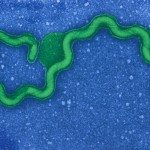Lien vers Pubmed [PMID] – 39018329
Lien vers HAL – hal-04878020
Lien DOI – 10.1371/journal.ppat.1012161
PLoS Pathogens, 2024, 20 (7), pp.e1012161. ⟨10.1371/journal.ppat.1012161⟩
Pathogenic Leptospira are spirochete bacteria which cause leptospirosis, a re-emerging zoonotic disease of global importance. Here, we use a recently described lineage of environmental-adapted leptospires, which are evolutionarily the closest relatives of the highly virulent Leptospira species, to explore the key phenotypic traits and genetic determinants of Leptospira virulence. Through a comprehensive approach integrating phylogenomic comparisons with in vitro and in vivo phenotyping studies, we show that the evolution towards pathogenicity is associated with both a decrease of the ability to survive in the environment and the acquisition of strategies that enable successful host colonization. This includes the evasion of the mammalian complement system and the adaptations to avoid activation of the innate immune cells by the highly-virulent Leptospira species (also called P1+ species), unlike other species belonging to the phylogenetically related P1- and P2 groups, as well as saprophytes. Moreover, our analysis reveals specific genetic determinants that have undergone positive selection during the course of evolution in Leptospira , contributing directly to virulence and host adaptation as demonstrated by gain-of-function and knock-down studies. Taken together, our findings define a new vision on Leptospira pathogenicity, identifying virulence attributes associated with clinically relevant species, and provide insights into the evolution and emergence of these life-threatening pathogens.




